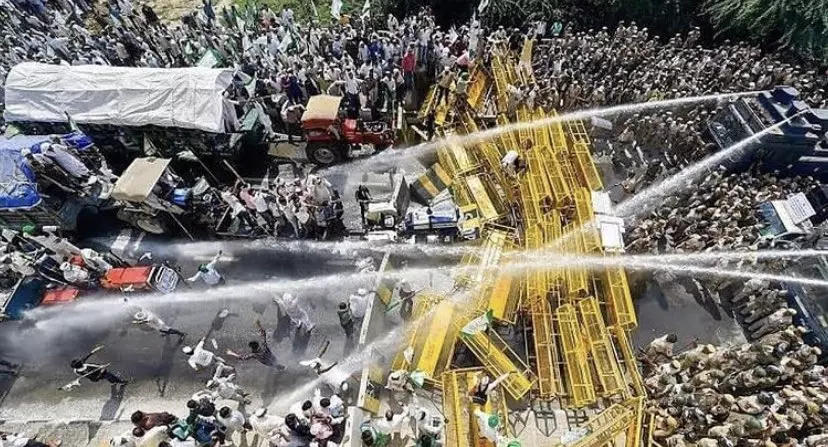
Defying tear gas and water cannons, another batch of farmers march to Delhi
text_fieldsBraving tear gas and water cannons for the second day on Friday, another batch of protesting farmers, numbering in thousands, from the interiors of Punjab breached the massive blockades comprising huge boulders, barbed fences and mounds of earth on the Bathinda-Dabwali road to enter Haryana on their onward march to Delhi for a planned protest against the new Central farm laws.
The farmers were led by the Bharatiya Kisan Union (BKU) Ekta-Ugrahan, which opted to stay back at the Khanauri border in Punjab's Sangrur district on Friday. It said over 100,000 farmers are expected to reach the border of Delhi in the night.
Simultaneously, hundreds of thousands of farmers belonging to the Kisan Sangharsh Committee started their journey from Amritsar city towards Delhi via Haryana.
It's state general secretary, Sarwan Singh Pandher, said farmers from Amritsar, Tarn Taran, Batala and Gurdaspur districts are heading towards Delhi.
Riding on more than 4,000 tractor-trailers and nearly 1,500 buses, besides cars and motorcycles, the farmers, comprising women and children, belonging to the BKU Ekta-Ugrahan, started marching towards Delhi after breaking barriers at Dabwali and Jind in Haryana.
An advance team of farmers, largely comprising youth, has been taking the lead of the cavalcade of loaded tractors of daily essentials to clear the blockades erected by the police to make way for the protesters to move ahead without obstructions.
Farmers representing 31 farm bodies have announced that they will reach Delhi through several routes -- Lalru, Shambhu, Patiala-Pehowa, Patran-Khanauri, Moonak-Tohana, Ratia-Fatehabad and Talwandi-Sirsa.
At the Shambhu barrier, near Ambala, tear gas and water cannons were used on the farmers for the second day. Later in the day, the police removed all the barricades and allowed free movement of the protesters and other commuters.
A huge contingent of police, including Rapid Action Force, was deployed at all the entry points to Haryana, while residents of several towns located along the Punjab-Haryana borders faced a harrowing time due to the heavy deployment of security forces and snapping of bus services in the past 48 hours.
Amid the protests, 'langar' or community kitchens were put up by the special committees comprising women and elders to feed the scores of farmers.
The farmers have received thousands of litres of milk and fruits the villagers of Punjab and Haryana.
Punjab Chief Minister Amarinder Singh has once again reiterated that the voices of the protesting farmers "cannot be muzzled indefinitely".
Hailing the Centre's decision to allow the agitating farmers to enter Delhi, he slammed the Haryana government for its continued use of brute force to stop farmers even after the Union government's conciliatory move.
Though the Central government has allowed the farmers to enter the national capital to exercise their democratic right to protest, the Haryana government is engaged in a confrontationist approach against the farmers moving towards Delhi, said the Chief Minister in a statement, condemning the Manohar Lal Khattar government's actions.
He also reiterated his appeal to the Centre to initiate immediate talks to address farmers' concerns on the farm laws and resolve the simmering issue.
Meanwhile Union Agriculture Minister Narendra Singh Tomar said that the government has always been ready to discuss issues with farmers.
"We have invited farmers' organizations for another round of talks on 3rd December. I appeal to them to leave agitation in view of COVID-19 and winter," Tomar added
Haryana Chief Minister Khattar appealed to the farmers to directly talk to the Centre regarding their demands.
"The Central government is always ready for talks," Khattar said in a tweet.
Khattar also told the farmers that the path of stir could not be a medium for the resolution of problems and asserted that a solution will emerge from talks.
Meanwhile, Shiromani Akali Dal (Democratic) President and Rajya Sabha member Sukhdev Dhindsa has written to the Chairperson of the National Human Rights Commission against the Centre and Haryana governments' brutality on the farmers.
Dhindsa said the governments had denied the right of the farmers to protest peacefully by sealing the borders and obstructing their movement.
The farmers are protesting against the farm laws as they feel that these laws would pave the way for the dismantling of the minimum support price (MSP) system, leaving them at the mercy of big corporate entities.























